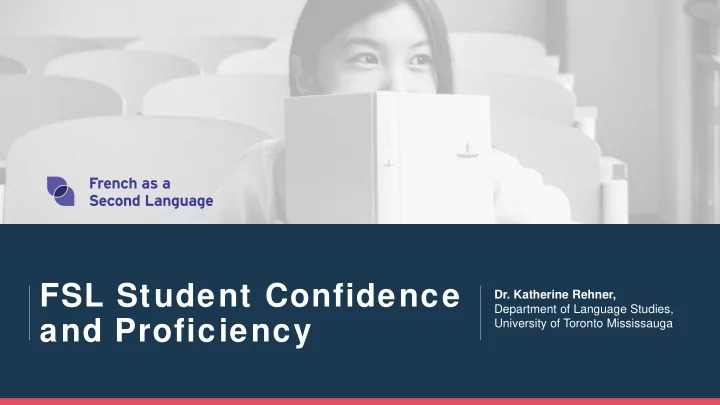

FSL Student Confidence Dr. Katherine Rehner, Department of Language Studies, and Proficiency University of Toronto Mississauga
Agenda 01 Proficiency 04 Conclusion Connections to your practice Ways forward 02 Confidence 05 DELF Engagement and Impact Connections to your practice Engagement with the DELF 03 Linking Proficiency & Confidence
FSL Student Proficiency
Proficiency FSL Student Proficiency and Confidence Pilot Project (2013-2014) • Funded by • Government of Ontario • Government of Canada—Department of Canadian Heritage • Directed by • Curriculum Services Canada Common European Framework of Reference
Basic Users • Familiar expressions, basic phrases • Routine tasks, exchange of information Independent Users • Simple connected text, familiar topics • Native speakers: fluency & spontaneity CEFR & DELF
Student Sample 434 Grade 12 FSL Students 14 Ontario English-language Boards A2 - 84 students B1 - 207 students B2 - 143 students
Data Collection—DELF • Self-selected level • Certified examiners o From Boards, but not students’ teachers
Data Collection — Student Survey Background info • What languages • Which FSL programs • Extra-curricular exposure • Use of French media Confidence • conversing, listening, writing, reading • range of situations and speakers Self-rated exam performance
Sample by Program Core Extended Immersion RED = Level A2 PURPLE = Level B1 BLUE = Level B2
1. How did the students perform on the DELF overall and by skill area? - 72% - 62% - 79% Average DELF score — 70%
1. DELF performance (continued) + all other skills + + +
2. Which sub-skills w ere strongest and w hich offered most room for improvement? Strengths Improvement
Proficiency- Related Conclusions Elizabeth Hoerath Transforming FSL Website Curriculum Services Canada http://www.curriculum.org/fsl
Proficiency-Related Conclusions Dials of Difficulty
Proficiency-Related Conclusions Using grammar and vocabulary in context • Spontaneous • Unrehearsed • Subtleties of use • Facilitate communication • Action-oriented • Inductive
Connections to Your Practice • How do these DELF results compare to your observations of FSL proficiency in your own teaching context? • What have you tried in your own practice to improve your students’ FSL proficiency?
FSL Student Confidence
1. How confident are the students in each skill area? Overall
2. In w hich situations do the students feel most and least confident in each skill area?
2. Situations (continued)
2. Situations (continued) “Socio-situational factors outweigh the impact of underlying skill-confidence”
3. How do interactive and receptive exposure impact student confidence in each DELF level by skill area?
3. Interactive and receptive exposure (continued)
3. Interactive and receptive exposure (continued) Interactive = oral Receptive = written Limited impact Impact across skills
Confidence-Related Conclusions = =
We need to work explicitly on confidence.
Connections to Your Practice • How do these survey results compare to your observations of FSL student confidence in your own teaching context? • What have you tried in your own practice to improve your students’ FSL confidence?
Linking Proficiency & Confidence
1. How is confidence in each skill area related to DELF scores for the same skill? all skills (except writing)
2. How do interactive and receptive exposure impact students’ performance on DELF components? none (except receptive = oral comprehension)
3. How is situational confidence in each skill area related to DELF scores for the same skill? = = all skills (except written production) = none
4. Does self-assessed performance on each DELF component pertain to students’ scores for that component? YES! Except:
Conclusions: Connecting Confidence and Proficiency
Conclusion
Ways Forw ard: Proficiency Focus Level Strengths Areas for Improvement Overall proficiency All Written comprehension Oral comprehension Proficiency by level A2 Written comprehension Written production B1 Written comprehension Oral comprehension B2 Oral prod. & written comp. Written production Proficiency by sub-skill A2 Following instructions Use of grammar in context Following instructions, Grammar and vocabulary in context B1 information B2 Following instructions, Grammar and vocabulary in context information
Ways Forw ard: Confidence Focus Level Strengths Areas for Improvement Skill-based confidence All Reading Conversing Non-Francophones, individual Situational confidence All Francophones, large groups, strangers communication, friends A2 Conversing Interactive exposure B1 Conversing, listening, reading supports confidence B2 Conversing A2 Written skills Receptive exposure B1 Productive skills supports confidence B2 --
Ways Forw ard: Confidence & Proficiency Focus Level Strengths Areas for Improvement A2 Written skills Oral skills Confidence and B1 Oral skills Written production proficiency B2 Oral production -- A2 Productive skills Exposure and B1 Oral skills Proficiency B2 -- A2 Written skills Oral skills Situational confidence B1 Oral skills, written comp. Written production and proficiency B2 All skills -- A2 Receptive skills, written prod. Oral production DELF confidence and B1 All -- proficiency B2 All --
DELF Engagement & Impact
Engagement w ith the DELF • For those boards that are engaged in the DELF, what factors encourage you to do so? • For those boards not engaged with the DELF, what is preventing you and what supports would encourage you to do so?
DELF in the Classroom How has your involvement with the DELF impacted your classroom practices (or how do you imagine it would)?
MERCI !
Recommend
More recommend